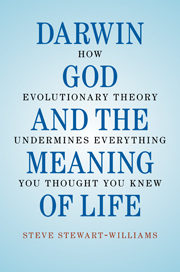 Darwin, God and the Meaning of Life
Darwin, God and the Meaning of Life Book contents
- Frontmatter
- Contents
- Acknowledgments
- 1 Darwin and the big questions
- Part I Darwin gets religion
- 2 Clash of the Titans
- 3 Design after Darwin
- 4 Darwin's God
- 5 God as gap filler
- 6 Darwin and the problem of evil
- 7 Wrapping up religion
- Part II Life after Darwin
- Part III Morality stripped of superstition
- Suggestions for further reading
- References
- Index
7 - Wrapping up religion
Published online by Cambridge University Press: 05 June 2012
- Frontmatter
- Contents
- Acknowledgments
- 1 Darwin and the big questions
- Part I Darwin gets religion
- 2 Clash of the Titans
- 3 Design after Darwin
- 4 Darwin's God
- 5 God as gap filler
- 6 Darwin and the problem of evil
- 7 Wrapping up religion
- Part II Life after Darwin
- Part III Morality stripped of superstition
- Suggestions for further reading
- References
- Index
Summary
We have thus arrived at the answer to our question, What is Darwinism? It is atheism. This does not mean … that Mr Darwin himself and all who adopt his views are atheists; but it means that his theory is atheistic; that the exclusion of design from nature is … tantamount to atheism.
Charles Hodge (1874), pp. 176–7The true evolutionary epic, retold as poetry, is as intrinsically ennobling as any religious epic. Material reality discovered by science already possesses more content and grandeur than all the religious cosmologies combined. The continuity of the human line has been traced through a period of deep history a thousand times older than that conceived by the western religions.
E. O. Wilson (1998), pp. 289–90If oxen and horses and lions had hands and could draw as man does, horses would draw the gods shaped as horses and oxen like oxen, each making the bodies of the gods like their own.
XenophanesHumanizing nature
Up until now, the conceptions of God we've been dealing with have all had one thing in common: they are traditional, anthropomorphic conceptions of the deity. In other words, they all involve a God that in some sense resembles a human being. Admittedly, these conceptions are not as overtly anthropomorphic as the gods and goddesses of ancient Greece or traditional Hinduism – or, for that matter, the original Abrahamic God, from which today's more rarefied God concepts have descended.
- Type
- Chapter
- Information
- Darwin, God and the Meaning of LifeHow Evolutionary Theory Undermines Everything You Thought You Knew, pp. 128 - 138Publisher: Cambridge University PressPrint publication year: 2010


